Short Reviews of MANY Samurai Films, AKA The Toshiro Mifune Fan Post
Other Samurai Posts
More Samurai Film Reviews! AKA The Zatoichi Fan Post
Husband John has recently started showing me his large samurai/kurosawa film collection. It’s been a lot of fun and I’ve been really enjoying it so far. Here are my brief reviews of what we’ve watched so far, in case anyone else is interested in getting into this genre. John’s collection is all on DVD, but I know a lot of these films are available on streaming through the Criterion Channel and for rental on Amazon Prime.
I’ll keep adding more of these as we watch them because John has a ton of them and like, what else are we going to do right now during all this self-isolation?
(** = favorites)
- Throne of Blood (Spider Web Castle) (directed by Akira Kurosawa, 1957)- very good and beautifully done, but since it's based off of Macbeth, it's obviously pretty dark. I'm sad that there's only one "witch" vs. the original three and the lack of Macduff removes a lot of the personal cost of Macbeth's choices, but as friend Jeff pointed out, it makes Macbeth's ultimate fall and death more obviously the consequences of his own choices. (starring the glorious Toshiro Mifuno)
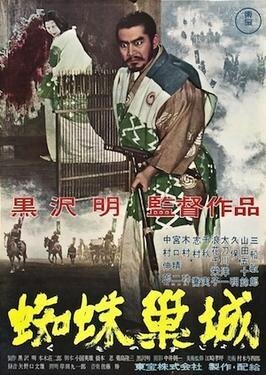
Throne of Blood
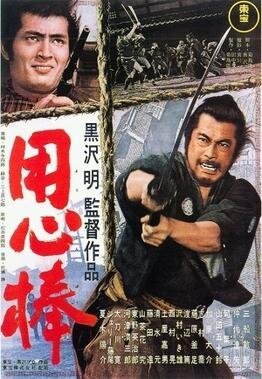
Yojimbo
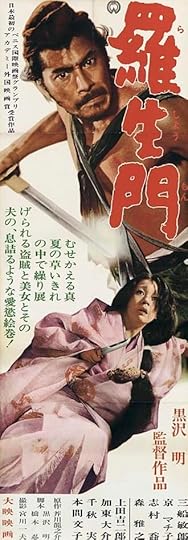
Rashoman
- Rashomon (Directed by Akira Kurosawa, 1950)- This film shows the same crime from the viewpoints of five different people, who tell the story in incredibly different ways. This film is considered one of the greatest ever made and spawned an entire type of story-telling commonly seen in TV shows called “The Rashomon Effect.”
It’s all beautiful and interesting and gorgeously shot, but I’ll admit that my favorite portions were honestly the ones with just the three dudes talking at the gate, trying to figure out this story. I would have loved it if the one female character wasn't so obviously deceitful and kinda evil though - like - can we understand WHY she wanted to leave her husband and go with the bandit? Was it an arranged marriage? Does she long for adventure? Come on. The shots directly at the sun were gorgeous and I loved the subtle differentiations from the versions of the story, like when the bandit tells the story, the sword fight is glorious and amazing, but when the random bystander tells the story, the sword fight is clumsy and awkward. (starring the glorious Toshiro Mifuno)
- Yojimbo (the Bodyguard) (Directed by Akira Kurosawa, 1961)**- My FAVORITE so far. The main character is a grumpy nameless unemployed samurai (ronin) who plays two sides of a gang war off each other to make money but ultimately does the right thing to save the lives of some of the innocents around town. The film is heavily inspired by Westerns and you can tell. From that summary, it doesn't sound hilarious, but it IS, I promise you. (starring the glorious Toshiro Mifuno)
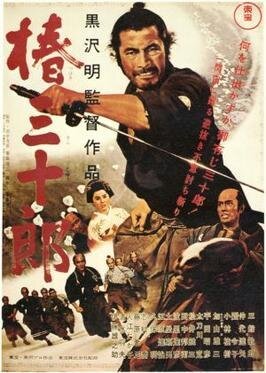
Sanjuro
- Sanjuro (Directed by Akira Kurosawa, 1962)**- The grumpy samurai with a hidden heart of gold from Yojimbo (who often uses the name Sanjuro, but it's heavily implied that this is a fake name, as he makes up his names by looking at random plants and taking their names as his own) returns in this film, where he ends up helping out a gang of well-intentioned fools who were trying to root out corruption in their clan and almost get themselves and their family members killed in the process. Sanjuro helps them out but does it in his own style, calling them idiots much of the movie. There's also an ultra hilarious bit with a captured bandit occasionally emerging from the closet in which he's been stashed to make commentary/celebrate with the heroes, and then quickly returning to the closet when he's noticed. (starring the glorious Toshiro Mifuno)
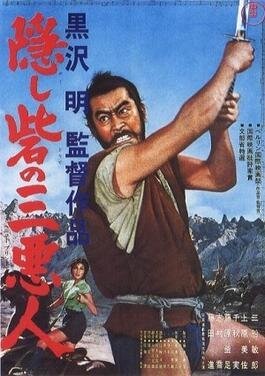
The Hidden Fortress
- The Hidden Fortress (Directed by Akira Kurosawa, 1958)- The samurai movie that greatly inspired George Lucas while he was making Star Wars! A princess and a general, some of the last survivors of their clan after a devastating war, attempt to travel with their clan's remaining gold. across enemy territory to get to safety with an ally. The story is told from the viewpoint of two greedy peasants who bicker constantly, who heavily inspired the introduction of Star Wars with R2-D2 and C3PO. Some of this movie is hilarious and some of it is beautiful (a scene in which a huge group of captured peasants stages a breakout and tries to escape down a long flight of stairs is particularly well shot), but the pacing is really odd and slow at times and I occasionally found myself bored even during dramatic sword fights. There’s also a scene where the two greedy peasants openly plot to rape the princess and it is SO FUCKED UP (don’t worry, they don’t succeed). But at least most of the men wear Very Tiny Shorts that show off their Very Toned Legs, which provides just so much entertainment. (featuring the glorious Toshiro Mifuno)
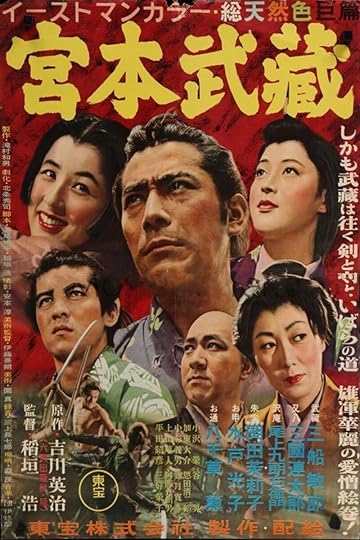
Samurai I
- Samurai I: Miyamoto Musashi (Directed by Hiroshi Inagaki, 1954)- The first of a trilogy about legendary samurai Miyamoto Musashi. The story itself is well told and beautifully shot, but has some weird plot holes and details that it never bothers to explain, like why the hero is initially considered "wild" and why everyone is trying to capture him. But all the characters are really wonderful and are introduced in a really interesting way. The opening scene with Tensuke and Matahachi talking about their dreams in a tree is beautiful. Akemi and Oko are introduced in a way that makes them seem all really nice; their inner villainy is only gradually revealed. I also really love Otsu and how she goes after the man she wants in a time when like…that’s not a thing women were suppose to do. (starring the glorious Toshiro Mifuno)
[SPOILERY: Also, the conclusion has a monk capture the hero and lock him in a tower with books for three years until he emerges as a better, wiser man, which I have some SERIOUS problems with. It’s very WTF.]
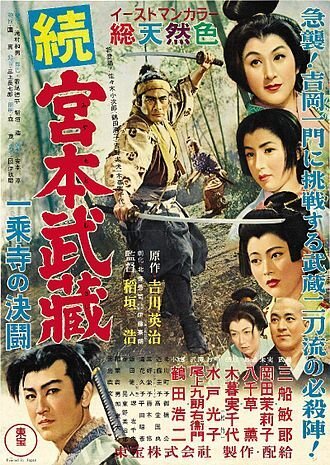
Samurai II
- Samurai II: Duel at Ichijoji Temple (Directed by Hiroshi Inagaki, 1955)- This is probably my favorite of the three films, as Musashi's growth in this film actually makes sense and some of the subplots in the background are really entertaining. Why is this one school of sword fighters utterly determined to gang up on Musashi and treat him poorly even when their own founder wants to fight him honorably? Why is Akemi's mother a horrible person who pimps her out and later abandons her? Why does Musashi's former friend Matahachi want to kill him when all this friend's misfortune is the result of his own poor decisions? Why is Akemi so mean and why is she so obsessed with Musashi now? Why does everyone want to kill poor Otsu? We don't know. But it's fun to watch it happen. Other historical samurai Saski Kojiro is introduced in this film and he's very handsome, honorable, and funny in his own way.(starring the glorious Toshiro Mifuno)
[SPOILERY: The romance between Musashi and Otsu is also really beautiful, although I'm irritated behind reason at the end of the film when Musashi (the man she's waited for and searched for for like, 4+ years) tries to kiss her and she's immediately like /no, cries/ and he leaves because he's...confused? I don't know. It's all stupid and neither of their actions make sense given everything we know about their great love for each other]
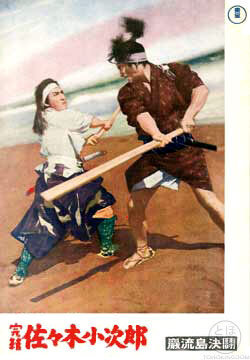
Samurai III
- Samurai III: Duel at Ganryu Island (Directed by Hiroshi Inagaki, 1956) - This film gives a satisfying conclusion to Musashi’s story but weirdly abandons some of the minor characters from the previous two films. Matahachi? Gone without a trace and zero explanation for where he went. Akemi’s villainous mother Oko is never seen, and her absence is explained only very briefly. But the plotting in this movie probably makes the most sense of all the films in this trilogy?
Musashi himself has grown into a Mature And Wise Samurai who makes Smart Decisions and doesn’t just kill people willy nilly. He decides to peace out with his kid mentee from the previous film and his new mentee (a random guy who threatened to kill him until he saw him catch a fly with chopsticks out of thin air and turned into the surprised Pikachu meme) and go run a farm for a year. Otsu and Akemi both follow him and confess their love, Akemi predictably causes trouble, etc. etc. Eventually Musashi fights Sasaki in the duel in the title. (starring the glorious Toshiro Mifuno)
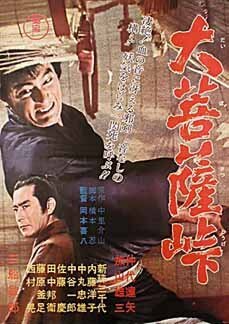
Sword of Doom
- Sword of Doom (directed by Kihachi Okamoto, 1966)- This is a very interesting film that actually has an amoral and villainous samurai as its protagonist. He basically kills a lot of people without feeling badly about it and ultimately gets his comeuppance, but the plot is actually a lot more complicated and interesting than that, but hard to summarize just in a paragraph or two. I actually quite like it, but it’s definitely the strangest film we’ve watched so far. Mifuno plays a relatively minor role as the head of a sword fighting school who shows up later in the film. (featuring the glorious Toshiro Mifuno)
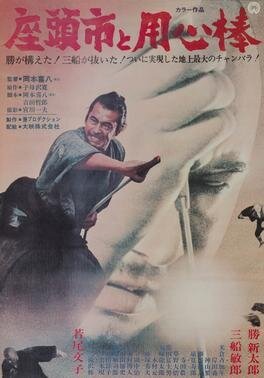
-Zatoichi meets Yojimbo (Directed by Kikachi Okamoto, 1970)** - This film is utterly ridiculous but hilarious. Zatoichi is a blind master swordsman/masseuse (because that’s a thing in Japan apparently) and this is the TWENTIETH film starring him. He’s a very mild mannered character who’s basically Japanese Daredevil, with insane fighting skills and heightened sense that he uses to bring justice to the world. Mifune plays a “yojimbo” (bodyguard) who is similar to his grumpy samurai character with hidden heart of gold in Yojimbo/Sanjuro, but distinctly different. Basically, Zatoichi goes back to his hometown and found that LOTS has changed, as the townspeople are all afraid of a local gang. The plot is a bit complicated, and features a money skimming scheme from the government mint, but basically Zatoichi and Yojimbo constantly are trying to kill each other, drink together, or outsmart the gang together. Hilarity ensues in many many ways. (starring the glorious Toshiro Mifuno)
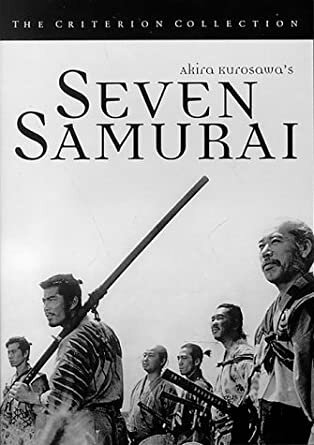
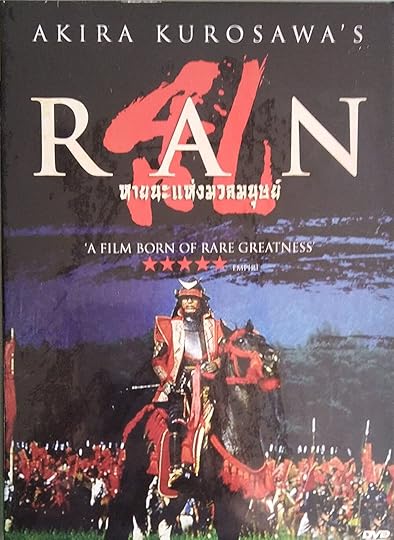
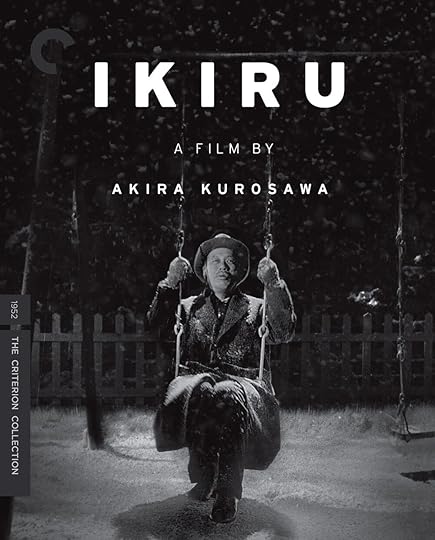
I’ve also previously watched these Kurosawa films with John back in August 2019 or earlier, so I want to re-watch them again now with the Samurai knowledge I have now. :)
- Seven Samurai (1954)
- Ran (1985)
- Ikiru (1952) (not a samurai film, but an important kurosawa work)



